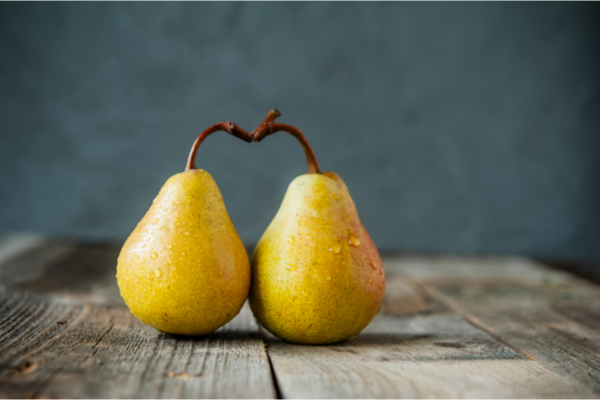An apple a day may keep the doctor away, but is America’s love for the crisp, juicy fruit overshadowing others? December is National Pear Month, and it’s the perfect time to Give Pears A Chance! Plus, pears have a wide array of fantastic health benefits. Here’s how pear nutrition stacks up along with four science-backed health benefits of pears that’ll get you pumped for pear season!
Just the Pear Facts, Ma’am
Pears are a delicious, low-calorie snack, and they’re also chock-full of hard-to-get nutrients. Here’s the nutritional breakdown for one medium-sized pear (Source: USDA Food Composition Databases):
- Calories: 101
- Fat: 0g
- Saturated Fat: 0g
- Trans Fat: 0g
- Carbohydrates: 27g
- Fiber: 6g
- Sugar: 17g
- Added Sugar: 0g
- Protein: 1g
- Magnesium: 12mg
- Potassium: 206mg
- Vitamin C: 8mg
Pears deliver a hefty amount of fiber, which helps keep you full and keeps your heart and gut healthy. Pears are also relatively low in calories and have no added sugar. Pair your pear with protein—think cheese or nuts—for a well-rounded healthy snack.
Pears Are Seriously Good for Your Digestion
Boasting 6 grams of fiber, pears have more fiber than a 1-cup serving of kale! From helping you maintain a healthy weight to reducing your risk of developing type 2 diabetes, eating enough fiber is integral to a well-balanced diet. Not to mention, we’re very thankful for the digestive benefits a high-fiber diet provides (fiber makes your poop softer and bulkier, making it easier to go), and we love that we can get over 20 percent of our daily recommended value from a pear.
Pears Have a Low-Glycemic Index
Even though pears have some natural sugar, their high fiber content ensures your blood sugar won’t go soaring after eating one (which makes them a perfect on-the-go snack for people with diabetes) Plus, their low-glycemic index means you won’t be hungry minutes after snacking on one.
Pears Are Good for Your Heart
According to Harvard Health, eating more fiber-rich foods provides wonderful health benefits. Thought to play a role in decreasing blood pressure and cholesterol, getting enough fiber in your diet decreases your risk of developing heart disease. Since pears are high in fiber and potassium (which helps counteract excess sodium), they’re a great snack to incorporate into a heart-healthy diet!
Pears Are Free Radical Fighters
The vitamin C in pears fight off free radicals, which can put your cells under oxidative stress and lead to chronic disease. This means eating pears-and other foods high in antioxidants-can reduce your risk of developing cancer, diabetes, heart disease, and even neurodegenerative diseases like dementia!
The Bottom Line
With all of their health benefits, try swapping in a pear next time you’re craving a piece of fruit. Aside from the health benefits of eating pears, the fruit is wonderful to put in salads, bake on a savory and sweet flatbread or sweeten things up with a pear crumble or tart for dessert!
—
Photo Credit: Okrasiuk / Shutterstock.com
